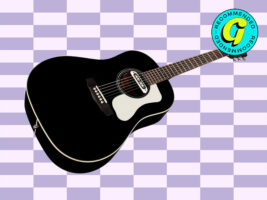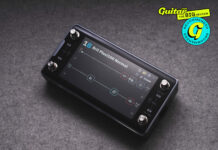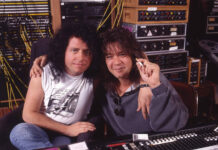
Guild DS-240E review – “This acoustic proved me wrong about soundhole pickups”
$649/£582, guildguitars.com
Guild has been marking itself out as a real friend of the budget-conscious acoustic buyer in recent months, not least with the excellent 300 series guitars that launched last year. The 300s really showed how the brand’s recent acquisition by Yamaha (along with the rest of the Cordoba group) has further enhanced the brand’s affordable options – the Japanese giant knows a thing or two about making great acoustic guitars at competitive price points after all.
READ MORE: Fender California Vintage King Antigua review – the most polarising guitar finish of all goes acoustic
Into this comes a new addition to the Memoir series – instruments that, like Gretsch’s hugely popular Jim Dandy range, aim to evoke the visual style of guitars from the 1920s and 30s at more accessible price points than a genuine Depression-era instrument.
Image: Press
Guild DS-240E – what is it?
The DS-240E is a slope-shouldered dreadnought design and like the rest of the Memoir series, is made in China, sports a solid Sitka Spruce top and laminate mahogany back and sides. The original Memoir guitars sported various shades of burst tops, but here they’ve made a much more vibey and interesting decision, and given it a solid matte black finish – accented in authentically 1930s style with white binding, a vintage Guild script logo and open gear vintage-style tuners.
Other elevations of the standard recipe include a rosewood fingerboard and bridge (no paper-based wood substitutes here), and an abalone-effect three-ring soundhole rosette. The other big thing that sets this guitar apart from its stablemates is that “E” at the end of the model designation, which indicates the presence of a soundhole pickup – in this case a passive DeArmond Tone Boss – which allows you to go straight into an amp or PA system via an endpin jack. The presence of the $100 Tone Boss pickup is also the reason for the $100 uplift over the base DS-240E – but is it worth it?
Image: Press
Guild DS-240E – playability and sounds
Before we start, I must confess that I’ve always been quite sceptical about soundhole pickups. I’ve never actually owned a guitar that has one, I have no reason for these negative feelings… I just don’t really like the look of them, blocking the soundhole like they do. But baseless pickup prejudice has no place in the heart of the open-minded guitar reviewer, so let’s see if I still feel that way after playing this thing for a while.
First up, any concerns I may have had about the pickup doing anything to the acoustic tonality of the guitar are nowhere to be found in practice. The DS-240E has pronounced high-end frequencies and clarity with medium mids and minimal bass tones. It’s a pleasant and very usable tone for singer-songwriters, and if you don’t have any need to plug in, this alone recommends the standard DS-240 model as a visually arresting budget option with big brand cachet.
But what I’m really here for today is the plugged-in sounds of course, and so I grab my trusty Boss AC-22LX amp and plug in. Keeping all of the EQ settings flat I’m blown away by the evenness of the tone produced by the Tone Boss. The pickup does an excellent job of increasing the volume of the bass tones and the middle frequencies while toning down the high-end tonality somewhat.
In all honestly, it is a sound that makes me wonder if my silly soundhole pickup prejudice has left me missing out on something really great all these years. The sound is warm, well-balanced and offers a realistic recreation of the guitar’s natural sound – not something that you can always say about the expensive piezo and mic-based systems found in much more expensive instruments.
The combination of a generous 1-3/4-inch nut width and comfortable C-shaped neck makes this an easy and inviting player too – especially in the lower end of the fretboard, where you have lots of room to move around.
Image: Press
Guild DS-240E – should I buy one?
It’s no exaggeration to say that the DS-240E has made me a believer in the qualities of a soundhole pickup – and the Tone Boss in particular. It’s hard to think of another guitar at this price point that sounds better than this when plugged in, and it’s no slouch when played acoustically either.
There are a few niggles that you have to put up with – most notably the lack of any kind of passive volume control is a real annoyance in a live setting. If it had some easy way to cut your sound when not using it or swapping guitars, it’d be nigh-on perfect. Also, it’s a shame there’s no gigbag or case for a guitar that’s pushing up to nearly $700 – many of its rivals at this price point ship with one as standard.
These are pretty minor issues in the grand scheme of things however, and this remains a fantastic and impressive instrument that isn’t just for intermediate players – any pro would be happy with its plugged-in sound, and that’s a huge point in its favour.
Guild DS-240E – alternatives
The visuals of this Memoir series guitar are heavily inspired by the affordable painted guitars of the Depression era, and so is Gretsch’s popular Jim Dandy range, of which the Deltoluxe Dreadnought ($279/£279) offers a hugely affordable soundhole-pickup acoustic option. Martin’s Remastered X Series guitars are very impressive for the money, and the new 0-X1 ($549/£499) offers similarly moody visuals with more subtle pickup options. If you want something a bit more California cool than Great Depression, the Fender Joe Strummer Campfire ($499/£409) is a lot of fun.
The post Guild DS-240E review – “This acoustic proved me wrong about soundhole pickups” appeared first on Guitar.com | All Things Guitar.
Source: www.guitar-bass.net











